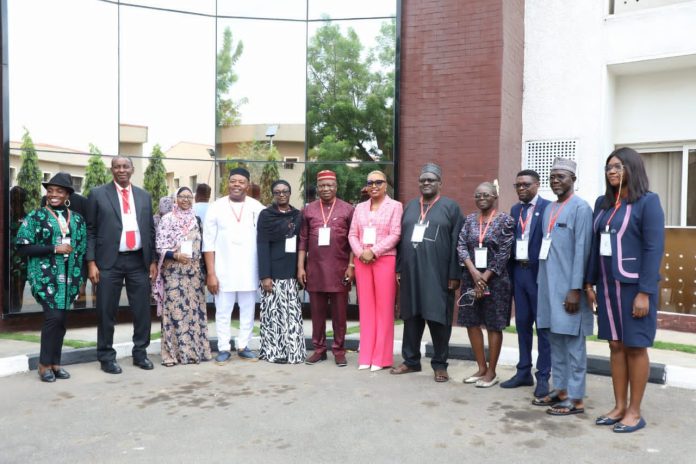By Emmanuella Oghenetega
To improve eye health outcomes in Nigeria, the Federal Ministry of Health and Social Welfare has reaffirmed its dedication, through strengthened leadership, robust partnerships, and inclusive collaboration across all sectors in the country.
This was the central message of the keynote address delivered by Dr. Paul Ntadom, Director of Public Health Department Federal Ministry of Health & Social Welfare at the 4th National Eye Health Coordination Meeting held in Abuja.
In his address titled “Strengthening Leadership, Strategic Collaboration, Partnership, and Progress Towards Improved Eye Health Outcomes in Nigeria,” Dr. Ntadom highlighted the foundational role of visionary leadership in driving equitable access to eye care across Nigeria. This was contained in a statement signed by Alaba Balogun, Deputy Director, Information & Public Relations
While delivering his speech, he stated that leadership is not just about position, it’s about vision, action, and impact.”
“Strong and collaborative leadership is essential to develop effective policies, mobilize resources, and integrate eye care into the broader health system, ensuring no one is left behind.”
Dr. Ntadom emphasized the need for multi-sectoral collaboration, involving government bodies, non-governmental organizations (NGOs), healthcare providers, private entities, and communities.
He called on stakeholders to strengthen partnerships, share knowledge, and innovate together in order to scale progress and sustainability in eye health delivery.
“We must measure progress by outcomes, by the increased access to quality services in underserved areas, by the implementation of data-driven policies, and by the empowerment of communities,” he added.
In her welcome address, Dr. Okolo Oteri, Director and National Coordinator of the National Eye Health Programme (NEHP), officially opened the meeting and welcomed representatives from all 36 states, international partners, desk officers, and civil society organisations.
She reaffirmed the ministry’s mission to deliver integrated, patient-centered eye care services that are accessible throughout an individual’s life course.
The event drew commendations from international partners, including Sightsavers, a long-time ally of Nigeria in the prevention of blindness.
Dr. Joshua Ibenu, speaking on behalf of the Country Director of Sightsavers, said the organization has partnered with Nigeria for over seven decades, starting with efforts to eliminate river blindness and expanding into broader eye care initiatives across several states.
“We envision a world where no one is blind from preventable causes,” Dr. Ibenu said. “This coordination meeting provides visibility and momentum to the cause of eye health. It is encouraging to see national and state-level actors coming together to share best practices and build a united front.”
He noted the growing integration of ear and other sensory health into eye health planning and called for stronger implementation of national policies at the state level. Dr. Ibenu also praised the Federal Government’s willingness to include private sector stakeholders in eye health initiatives.
“We’re seeing a significant level of inclusion and effort from the National Eye Health Programme. There is always room for improvement, but the foundation is strong, and collaboration is deepening,” he remarked.
From the states, practical testimonies emerged; according to Dr. Sam Bodawa, Desk Officer for Eye Health in Gombe State, who shared transformative progress since partnering with the National Eye Health Programme.
“Before NEHP’s intervention, eye care in Gombe was nearly non-existent. Now, we’ve trained 231 primary healthcare workers in 77 facilities, making basic eye services accessible even in remote villages,” Dr. Bodawa said.
He noted the success of the diabetic retinopathy and glaucoma training programs, and the distribution of over 31,000 reading glasses through the “Jiggy Bola” initiative, which has restored near vision for thousands of adults aged 40 and above.
“People who once depended on traditional healers now have trained health workers nearby. That’s a real impact,” he said.
Dr. Bodawa urged fellow desk officers to carry the meeting’s learnings back to their states and reinforce state-level programming.
Attached Photo:
Group Picture comprising participants and stakeholders with Dr. Oteri Okolo Director/National Coordinator National Eye Health Programme, FMoH & SW ( in pink apparel).


